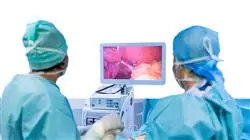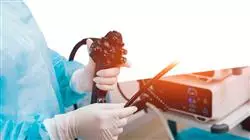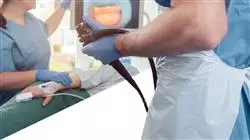University certificate
The world's largest faculty of medicine”
Description
Get up to date in the most avant-garde techniques of Oncologic Endoscopy, deepening in the most complex learning and developments of submucosal endoscopic dissection"

Oncological pathologies are one of the most evolving medical fields, and it is essential for every specialist to keep up to date with the latest technical indications and scientific knowledge in the material used in techniques such as endoscopic submucosal dissection, polypectomy and mucosectomy.
It is also important to incorporate into daily practice the latest developments in traction methods and subsequent management after excision, updating the most common complications in the resection of lesions such as hemorrhage, perforation or scar stenosis.
Thus, we present an academic program of great utility for the specialist who wants to maintain a high level of professional practice, with the latest scientific and technological advances compiled by a teaching team of great prestige and international experience.
A unique opportunity to continue perfecting the choice of the most updated and appropriate material and methods for each type of injury, with access to the most modern clinical guidelines and real case studies that help to contextualize all the theory taught.
All this in a 100% format, of maximum convenience for the specialist as they will not have to adapt to any type of schedule or face-to-face classes. The training material is available for download 24 hours a day, which makes it convenient to study it when, where and how it is best available.
Get up to date with the most recent discoveries in polypectomy and mucosectomy, knowing the latest generation materials used in the removal of different neoplastic lesions"
This postgraduate certificate in Endoscopic Submucosal Dissection General Indications contains the most complete and up-to-date scientific program on the market. The most important features include:
- The development of case studies presented by experts in Oncologic Endoscopy
- The graphic, schematic, and eminently practical contents with which they are created, provide scientific and practical information on the disciplines that are essential for professional practice
- Practical exercises where the self-assessment process can be carried out to improve learning
- Its special emphasis on innovative methodologies
- Theoretical lessons, questions to the expert, debate forums on controversial topics, and individual reflection work
- Content that is accessible from any fixed or portable device with an Internet connection
You will have access to all the content of the virtual campus whenever you want, deciding your own study times and rhythms"
The program’s teaching staff includes professionals from the sector who contribute their work experience to this training program, as well as renowned specialists from leading societies and prestigious universities.
The multimedia content, developed with the latest educational technology, will provide the professional with situated and contextual learning, i.e., a simulated environment that will provide immersive training programmed to train in real situations.
This program is designed around Problem-Based Learning, whereby the professional must try to solve the different professional practice situations that arise during the academic year. For this purpose, the student will be assisted by an innovative interactive video system created by renowned and experienced experts.
The best specialists in the digestive system and gastroenterology have elaborated this material thinking about your most urgent needs for updating in the field of Oncologic Endoscopies"

You will update your knowledge in an effective way, with first class case studies, interactive summaries and high-quality didactic material"
Objectives
Given the complexity of submucosal endoscopic dissection and the different types of materials used depending on the type and size of lesion to be treated, the objective of this program is to deepen in the most recent indications and advances with which the specialist will pleasantly update their approach to lesions of the digestive tract. Thanks to an expansion of polypectomy and mucosectomy with the most relevant scientific postulates, this program is the best possible academic option for professionals seeking a comprehensive and detailed update in this area.

You will maintain a high-quality professional practice thanks to the knowledge in resection techniques provided by this program"
General Objectives
- Develop the medical professional about endoscopic techniques of gastrointestinal tumor pathology related to diagnosis, treatment and complications in order to improve the quality of patient care
- Deepen the knowledge of the most commonly used endoscopic techniques in oncologic pathology in order to optimize their use in routine clinical practice
Specific Objectives
- Master the knowledge of submucosal endoscopic dissection in order to strengthen the theoretical knowledge of a highly complex technique.
- Control the different variants of mucosectomy that will allow us to obtain a higher success rate in the resection of the different lesions.
- Deepen in the necessary material for the development of the technique which will allow to choose the most optimal material according to the lesion to treat
- Develop the different techniques that help us to facilitate submucosal endoscopic dissection
- Professionalize the endoscopic management of the different complications derived from resection

You will meet your most demanding professional objectives thanks to teaching material that has the backing of the most prestigious academics and specialists"
Postgraduate Certificate in Endoscopic Submucosal Dissection. General Indications
Endoscopic submucosal dissection (ESD) is an endoscopic technique used to treat precancerous lesions or early cancer of the gastrointestinal tract. It is mainly used in the treatment of esophageal, stomach and colon cancer.
The ESD technique involves the separation and dissection of the mucosa and submucosa of the gastrointestinal tract through an endoscopic incision. This technique is performed with specialized endoscopic instruments that allow complete removal of layers of the mucosa and submucosa of the gastrointestinal tract, along with potential cancer cells that may have invaded these layers.
ESD is considered a very precise and delicate procedure, which is performed after a thorough evaluation of the lesion by an experienced endoscopist. Dissection can be performed submucosally, which allows for greater precision and protection of the deeper layers of the gastrointestinal tract.
Indications for ESD include the treatment of tumors and precancerous lesions in the gastrointestinal tract, including adenomas, carcinoids, neuroendocrine tumors, among others. The DES technique can also be used to avoid an operation or removal of the involved area.
As with any endoscopic procedure, ESD has risks. Perforation, bleeding and other problems can occur as complications. For this reason, it is important that the procedure be performed by an endoscopist skilled in the management of the technique.
Endoscopic submucosal dissection (ESD) is an endoscopic procedure used primarily in the treatment of early cancer of the gastrointestinal tract in order to remove precancerous lesions. The technique involves the removal of mucosal and submucosal layers of the gastrointestinal tract through an endoscopic incision using specialized instruments. ESD is used to avoid an operation or removal of the affected area and can be performed after a thorough evaluation of the lesion by an experienced endoscopist. Upon completion of the course, students will be qualified to perform the ESD technique safely and effectively, assess and manage potential complications, and design postoperative follow-up and treatment plans. This will enable them to work with patients with gastrointestinal injuries in hospitals and health care facilities using ESD as a treatment technique.







